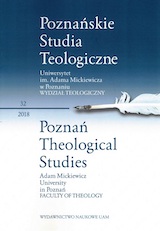Wpływ perykopy Mk 16,9-20 na znaczenie rzeczownika ἀρχή w Mk 1,1
Influence of the pericope Mk 16,9-20 on the meaning of the noun ἀρχή in Mk 1,1
Author(s): Daniel DzikiewiczSubject(s): Theoretical Linguistics, Semantics, Evaluation research, Biblical studies, Translation Studies
Published by: Uniwersytet im. Adama Mickiewicza w Poznaniu
Keywords: The first word of the Gospel of Mark; the canonical ending of the Gospel of Mark; the phenomenon of combining biblical texts and its influence on the semantics of words; translation;
Summary/Abstract: This study is devoted to the issue of the influence of the pericope Mk 16,9-20 on the semantic meaning of the noun ἀρχή in Mk 1,1. The starting thesis is: after the joining of the so-called canonical ending Mk 16,9-20 to the Gospel of Mark, the first word of this work ἀρχὴ, lost the meaning of the beginning and assumed the value of the summary in the sense of a collection of basic kerygmatic information about the Event of Jesus Christ. In order to demonstrate the validity of the put forward hypothesis, the current study has been divided into two parts. The first part discusses the issue of the phenomenon of combining biblical texts and its influence on the semantic meaning of particular words or pericope. The second part, however, gives arguments for the proposed solution. The semantic argument shows that the word ἀρχή may have the meaning of summary. The translational argument cites some examples of biblical translations of the word ἀρχή as a certain summary. The scriptural argument shows that canonical gospels are a literary summary of the words and works of Jesus Christ. And the exegetical argument justifies the summary character of the entire first verse Mk 1,1.
Journal: Poznańskie Studia Teologiczne
- Issue Year: 2018
- Issue No: 32
- Page Range: 47-62
- Page Count: 16
- Language: Polish

